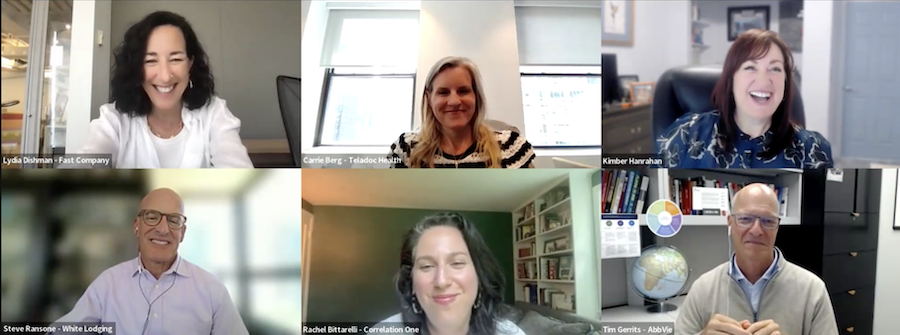Pathways to Growth: The Role of Learning and Development in Internal Mobility


In 2021, Correlation One, a workforce development program, partnered with Amazon to help promote employees in its warehouses and fulfillment centers to higher-paying jobs. “I’ve heard some really incredible stories about how life changing these types of programs can be as people move into family sustaining wages,” said Rachel Bittarelli, head of career coaching & development at Correlation One, during a recent From Day One’s July virtual conference.
One worker came to the United States on an asylum visa and went from being an Amazon frontline worker to getting a full-time job with Accenture, a digital technologies, data, and AI company that’s part of the Amazon ecosystem, says Bittarelli.
The four-month program that got her there “just had an incredible impact on her life and her family’s life,” Bittarelli told panel moderator Lydia Dishman, senior editor of growth and engagement at Fast Company. The initiative also helps Amazon, as it helps fill roles without having to look externally, which keeps employee satisfaction high.
Pathways for Upskilling and Reskilling
White Lodging, a Chicago-based hotel management company, designed and launched a career pathing program called Pathfinder last year with help from a consultant.
“[The program] looks at 120 different positions in the company and outlines the skills and training that’s needed in those roles,” said Steve Ransone, VP of talent and organizational capability for White Lodging. “And by aligning around them with their subject matter experts, we then have a common language that we could use when developing people.”
White Lodging is a people-focused company rather than a tech-oriented one, so having managers work individually with employees who want to move up in the organization is crucial, says Ransone.
“We are very much on a journey, and it’s a very passionate journey for me,
helping our people to not just send people to training because that’s the easy thing, but really develop them and really connect them back to the things that matter when it comes to being successful in a job,” he said.

Some managers need training to recognize the importance of giving their direct reports opportunities to develop their skills, says Carrie Berg, VP of learning and development at Teladoc Health. “Managers often set the tone for the employees on their team,” she said. “They create the space that allows the employees to participate and to learn.”
Berg recommends that managers market and promote upskilling opportunities to employees. “I believe in the value of branding, like, ‘This is going to be short, it’s going to be sweet, we’re going to give you a tool, a tip or a trick, we are not going to talk at you for 40 minutes with 40 slides,’” she said.
Employees also need to understand their strengths and weaknesses and have some level of self-awareness to know what skills they should work on, says Berg. Teladoc uses a tool to give workers insight into this so they know which learning resources are best for them.
Ensuring That Learning Opportunities are Equitable
When Kimber Hanrahan, head of learning and development for GoDaddy, was working for another tech company, the organization hired a blind man but didn’t have the software to support him during upskilling sessions.
Learning facilitators may be great at what they do, but they need to ensure that their tools are accessible to all employees trying to better themselves. “It’s important to ensure that you have those things enabled within your e-learnings.”
Tim Gerrits, head of learning & leadership development at AbbVie, said the company developed a tool similar to LinkedIn, but internally, to help all employees who wanted to advance within the company.
Employees who opt-in can create profiles that include their career interests so they can receive personalized job matches within the company, says Gerrits. “We send them matches at their current level, or one level above where they are today,” he said. Employees are also able to create their own job searches and alerts based on the criteria they put in.
AbbVie also measures the movement of its internal labor market for all talent segments. “Regardless of performance, regardless of potential, we measure that and representation as well, and we look for discrepancies and do an audit on how we are doing on our internal mobility,” Gerrits said.
Mary Pieper is a freelance writer based in Mason City, Iowa.
The From Day One Newsletter is a monthly roundup of articles, features, and editorials on innovative ways for companies to forge stronger relationships with their employees, customers, and communities.